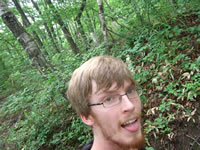


NanoJapan Researh Overview
I worked with two different research groups under the same professor, Itoh-sensei. One group was looking at constructing quantum computers by fashioning transistors out of selectively placed silicon isotopes on silicon “stair-step” constructs. The other group was studying boron diffusion in hopes to learn how to scale down construction of Metal Oxide Semiconductor Field Effect Transistors (MOS FET) to the nano-scale. My interests lie in energy conservation and production, so, although both projects did not touch on topics related directly to my future aspirations, they did help to engender in me a sense for how nano-technology research is conducted and the contemporary limits and scope of the field. I learned a great deal about boron diffusion and about the properties of different arrangements of silicon lattices, but, more importantly, I learned about how professional research is done by a world renowned team in Japan and about how I can participate. I was interested in graduate school before participating in NanoJapan, and now I am determined to attend. I want to get a PHD in geology, environmental engineering, or in chemical engineering. My inclination that nano-technology can lead to innovations in energy production and conservation is stronger now than it was before my participating in NanoJapan.
Meaning of NanoJapan
I chose the program so that I could explore both my interest in Asia and my eagerness to get more research experience in other fields besides chemical engineering. NanoJapan has encouraged me to pursue further international opportunities in Asia and I will spend the Spring 2008 semester at the National University of Singapore via the Rice University Exchange Program. I plan to return to Japan this summer to work for an energy policy “think tank”. I will take Japanese language course next month, and I will continue studying while working this coming summer.
Daily Life in Japan
An average day began with soba noodles and a sore head. My head would be sore, not from excessive sake the previous night, but rather from my bumping it on a door frame, the ledge above the toilet, the roof of the stairwell, or the ledge above the kitchen sink. I would cook soba and then ride my bike to the train station. I’d do my best to park my bike somewhere legal (proximity to other parked bikes is no guarantee!), and then I’d listen to podcasts and stare out the train car window until arriving at work. I’d make my way through the main undergraduate Hiyoshi campus, sometimes running into some of the music students I knew, until I reached Yagami, the graduate research campus. I’d proceed either to the basement or to the student room. In one of these two locations, I’d find either my work partners Jun-san or Youko-san, or one of my two bosses, Yasuo-san or Shiren-san. They would give me something to do. Regular tasks included: 1. flashing silicon chips, a process that involved reading numerous gauges and turning dials in rapid succession, and writing everything down. Every 20 seconds, I’d blast a chip with extreme current until the pressure inside the molecular beam epitax reached a certain level, then I’d write down the levels of all the gauges, drop the chip back to room temperature, and again record the gauges. This task takes a lot of concentration and coordination. Turning whilst writing, and at the same time looking at the next guage in preparation of writing its level. Kind of fun for geeks like me. Other tasks included preparing tungsten tips for the microscopes, correcting English grammar on coworkers’ presentation outlines, cleaning everything, dragging around and securing the “bombs” (80kg gas-filled cylindrical metallic containers), firing up the “oven” (boron diffusion machine) to conduct extreme temperature 36-hour-or-so experiments, etc. Did I mention cleaning everything? Man, we cleaned everything. Lunch happened sometimes, and it was always awesome except for the nato that Jun would make me try. I was hoping to “get used to it, and then become in love with the unique flavor”, as Jun put it. I never quite obtained this goal, but only shrank further and further from it after each experience. Somewhere between 8 and 11pm, I’d be done for the day.
At night, I’d either go home and sleep like a good boy, or I’d go out with the musicians, my flat-mates, some younger members of the lab group, or any of the various random friends I had met on previous excursions. I seldom saw the other NanoJapan participants who were also in Tokyo. I didn’t go clubbing or bar-hopping or to restaurants enough, which is a shame, but they are so expensive.
My Favorite Experience in Japan was...
I had a blast taking one friend, Ryoko, out for Indian food this one time. We both laughed until we were wheezing. Also, traveling north to Nagano for four days was worth every penny. I met amazing people, and I returned no longer feeling burnt out or exhausted.
While I was in Japan I wish I had...
Gone out more and been more outgoing. I was too worried about money, and I missed out on a once in a lifetime opportunity to really enjoy the company of Japanese student friends. Interesting how almost every country in the world besides America seems to have a developed club scene. I think I should have gone into the program with the expectation that I would spend more than I expected. Also, something about the shyness that springs from Japanese culture I found to be contagious. Had I been a little more extroverted and persistent, I could have gained additional interesting friends and learned a lot more about Japanese language and culture.